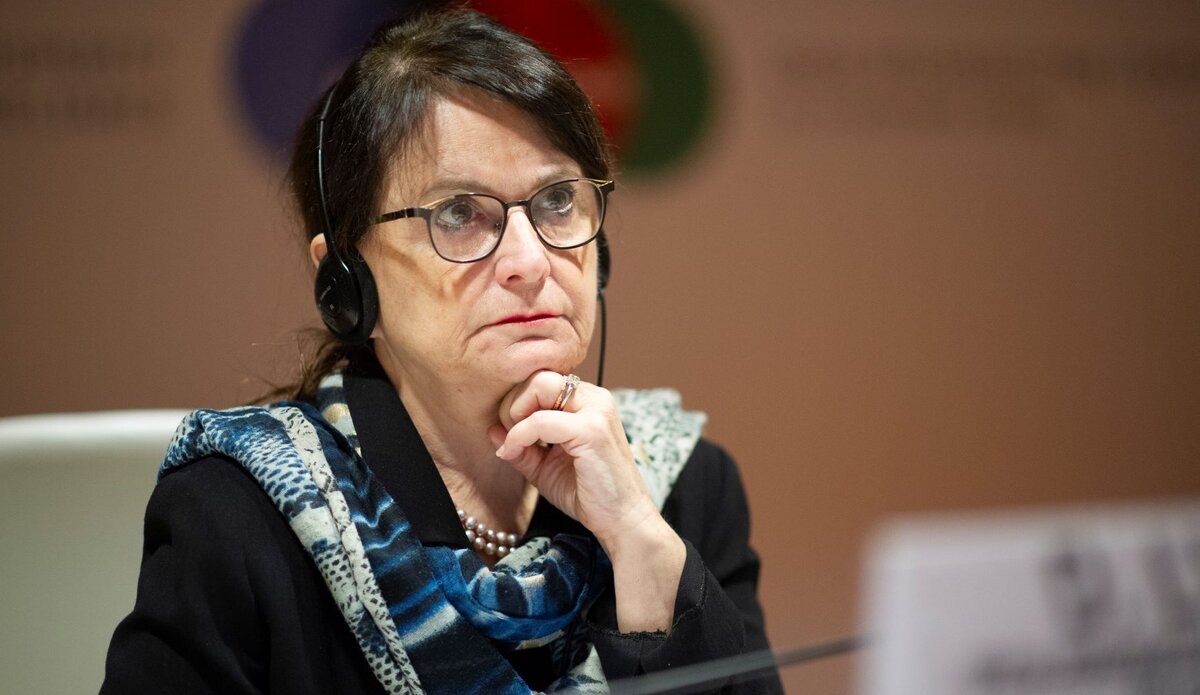SRSG Lyons at Afghanistan 2020 Conference session on fighting corruption
GENEVA - The following is a transcript of the opening remarks of the Secretary-General's Special Representative for Afghanistan, Deborah Lyons, at the Afghanistan 2020 Conference Side Event on Institutional and Societal Methods for Fighting Corruption.
TRANSCRIPT
Opening remarks delivered by Resident Coordinator A.I. for Afghanistan, Ramiz Alakbarov, on behalf of the Secretary-General's Special Representative for Afghanistan, Deborah Lyons, at the Afghanistan 2020 Conference Side Event on Institutional and Societal Methods for Fighting Corruption
[as delivered ]
Geneva, 23 November 2020
First Vice-President, Ministers, Excellencies, colleagues, ladies and gentlemen.
I am grateful for the opportunity to address you in this important side event and re-iterate the United Nations’ firm commitment to support you and others in addressing corruption in Afghanistan.
I thank the United Kingdom and the Afghan government for co-organizing this event with us and welcome the choice of its title “Institutional and societal methods for fighting corruption”.
Indeed, the rampant and cross-cutting nature of corruption requires an inclusive society-wide approach to combat it. Government and non-governmental stakeholders must collaborate in confronting corruption, this silent cancer steadily affecting all aspects of the lives of Afghan citizens.
To this end, we chose to give the first and the last word of this event to Afghan citizens who make a compelling case for the urgency in curbing corruption.
I am deeply moved how strongly Afghans – regardless of their age, gender, profession, and background – feel about corruption. They say “It is because of corruption that so many young Afghans are unemployed”, they say; “it is because of corruption that our air and water is polluted”; they say; “we are fed-up with corruption”.
It is past time for those who are responsible to be held accountable. And the systems that we, the Afghan Government and the international community, have been trying to build to counter corruption must now be completed. These systems and regulations are the hallmark of any functioning bureaucracy and act as a fortress against corruption.
And so we have developed new frameworks for an aid architecture that will deliver better results with less money and greater transparency, with the aspiration that these will support a healthy and prosperous future for Afghanistan.
I welcome, during last Friday’s Security Council Arria meeting, H.E. President Ghani’s commitment to “push for greater accountability” in the management and use of international financial support.
Prioritizing anticorruption measures among the many competing challenges has not always been an easy political choice.
However, corruption hampers security sector reform, handicaps economic progress, erodes trust in institutions, and prevents Afghans from enjoying their rights. Anti-corruption measures must always be a priority.
The COVID-19 pandemic is an additional stress-test for accountability and oversight mechanisms. COVID opens opportunities for corruption and fraud, when emergency measures lead to relaxing corruption safeguards. We must guard against this.
I thank the Ombudswoman and the Attorney General for joining us in today’s event to share their experience in addressing this challenge in Afghanistan.
During the recent EU Annual Anti-Corruption Conference in Kabul, we discussed next steps in improving Afghanistan’s legal, institutional and strategic framework.
This will assist both the Afghan Government and the ambassadors’ working group on anti-corruption led by the UK and EU ambassadors.
The implementation of this work will depend on broad societal support. I therefore commend the courage of Afghan civil society, media and grassroots movements to stand up against corruption and I welcome the participation of many representatives in today’s event.
The fact that Afghan investigative journalist, Zaki Daryabi, the founder of Etilaat e Roz, is among the four shortlisted nominees for Transparency International’s 2020 Anti-Corruption Award is an example of Afghanistan’s potential in confronting corruption.
In closing, let me reaffirm that we in UNAMA consider the work on anti-corruption as one of top priorities for the Government of Afghanistan and the regional and international community.
Thank you for your engagement. I look forward to a productive discussion.
 UN
UN







